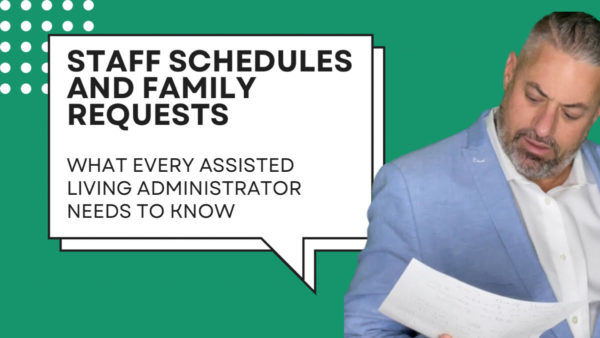
Staff Schedules and Family Requests: What Every Assisted Living Administrator Needs to Know
Running an assisted living facility (ALF) involves balancing numerous responsibilities, from ensuring residents receive high-quality care to maintaining compliance with Florida regulations. Among these regulations, 59A-36.010 Staffing Standards plays a critical role in ensuring transparency, accountability, and quality of care. However, a common misconception among administrators is that staffing schedules only need to be produced when requested by an attorney through a formal records request. This is not the case. Below, we will explore the full regulation, its requirements, and how to ensure your facility remains compliant.
Full Text of Regulation 59A-36.010 Staffing Standards
- Written Work Schedule
The facility must maintain a written work schedule that reflects its 24-hour staffing pattern for a given time period. - Transparency for Residents
Upon request, the facility must make the daily work schedules of direct care staff available to residents or their representatives. - Recordkeeping Requirements
The facility must maintain the written work schedules and staff time sheets for the most current six months.
Breaking Down the Regulation
This regulation has three straightforward yet crucial requirements:
- Maintaining Written Schedules:
- Your facility must keep a written work schedule that shows how staff are allocated to provide care 24 hours a day. This schedule must accurately reflect actual staffing patterns to ensure compliance.
- Providing Schedules to Families:
- Residents and their representatives have the legal right to request and review the daily work schedules of direct care staff. This goes beyond attorney requests or formal legal inquiries—families can make these requests at any time.
- Storing Schedules for Six Months:
- Your facility must keep written work schedules and staff time sheets on file for the most recent six months. These records must be readily accessible for audits, inspections, or resident requests.
Addressing the Common Misconception
Many administrators mistakenly believe that staff schedules are only relevant for legal matters, such as when responding to an attorney’s records request. However, the regulation explicitly states that these schedules must also be made available to residents and their representatives upon request. Failure to do so can lead to compliance violations, strained relationships with families, and a tarnished reputation.
By proactively providing transparency, you can avoid misunderstandings and demonstrate a commitment to quality care.
Why Is This Regulation Important?
- Transparency Builds Trust:
- By providing families access to staff schedules, you foster transparency and build trust. Families want reassurance that their loved ones are receiving the care they deserve.
- Accountability Enhances Compliance:
- Accurate, accessible schedules demonstrate that your facility is meeting staffing requirements and prepared for audits or inspections.
- It Prevents Compliance Issues:
- Keeping detailed records ensures you’re always ready to address requests from families, state inspectors, or other stakeholders.
Tips for Compliance
To comply with Regulation 59A-36.010 and avoid costly mistakes, implement the following best practices:
- Create a System for Recordkeeping:
- Use scheduling software or a reliable filing system to ensure all work schedules and time sheets are saved for at least six months.
- Regularly Audit Schedules:
- Periodically review schedules to confirm that they accurately reflect staffing patterns and meet residents’ needs.
- Maintain Backup Copies:
- Store schedules in both digital and physical formats to prevent loss due to technical issues or human error.
Consequences of Non-Compliance
Failure to comply with Regulation 59A-36.010 can lead to:
- State Penalties and Fines:
- Non-compliance can result in financial penalties and citations during inspections.
Final Thoughts
Transparency and accountability are at the heart of Regulation 59A-36.010. By understanding the full scope of this requirement and taking proactive steps to ensure compliance, you can build trust with residents and their families, avoid regulatory penalties, and maintain smooth facility operations.
Remember, compliance isn’t just about meeting legal requirements—it’s about demonstrating your commitment to quality care. If you need help creating systems to stay compliant or have questions about this regulation, don’t hesitate to reach out.